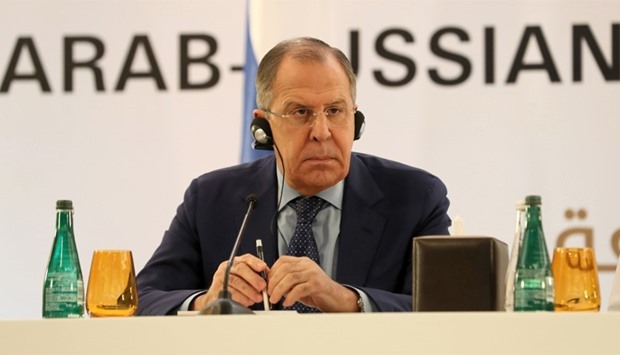‘The Trump administration should clarify its approaches,’ Lavrov told a press conference in Abu Dhabi.
Trump has given no indication of where in Syria he hopes to establish the zones, which he portrayed as an alternative to hosting Syrian refugees abroad.
Earlier this week, Damascus said that any attempt to set up safe zones without coordination with the government would be ‘unsafe.’ ‘The idea of safe zones was under consideration soon after the Syrian crisis broke out,’ Lavrov said, according to Russian state news agency TASS.
‘At the time, there was a possibility that the deplorable Libyan experience would be repeated, when a safe zone was declared in an area occupied by anti-government forces where some kind of an alternative government had been set up,’ he added.
‘I don't believe Washington is trying to take the same path once again,’ Russia's top diplomat said. ‘We are still struggling to help the Libyans restore their country's territorial integrity.’ NATO enforced a no-fly zone to support the popular uprising that toppled the country's dictator Moamer Gaddafi in 2011. At that time, opposition leaders were based in the eastern city of Benghazi, while Gaddafi controlled the capital Tripoli.
The alliance was accused of overstepping its mandate during the 2011 bombing campaign as violence intensified in the following years, and the oil-rich country is now widely considered a failed state.
Lavrov said Trump's proposal aims at reducing the number of refugees heading West from the region, but Moscow would be ready to discuss it.
The conflict has driven about half of Syria's pre-war population of 22 million from their homes, with many opposition-held areas devastated by repeated government airstrikes.
Lavrov was in the United Arab Emirates to discuss efforts to combat terrorism in the Middle East with the Arab League and his UAE counterpart Sheikh Abdullah bin Zayed Al Nahyan.
Abdullah said ‘it is too early to decide the UAE's stance before hearing more from the new US administration regarding safe zones in Syria.’ He added that Abu Dhabi welcomes a temporary approach that serves humanitarian purposes in the war-torn country.
Lavrov also called on the Arab League to allow Syria's return to the 22-member bloc, saying it would have helped joint efforts on the political settlement.
‘The fact that the Syrian government, a legitimate UN member, cannot take part in the Arab League discussions does not help our joint efforts. I think the Arab League could have played a more important role if the Syrian government was part of this organization,’ Lavrov said.
Syria's membership at the Arab League was suspended in November 2011, as the Gulf leaders supported the opposition forces against President Bashar al-Assad.
Arab League Secretary General Ahmed Aboul-Gheit said Syria's return to the bloc depends on the approval of its members.
‘The topic is not currently on the agenda,’ he said, adding that it is not expected to be discussed as long as a political settlement is still incomplete.

